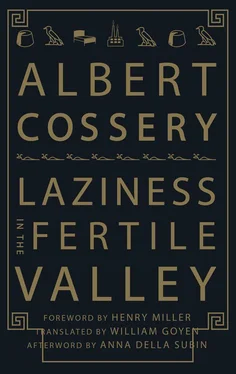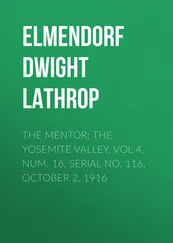Albert Cossery - Laziness in the Fertile Valley
Здесь есть возможность читать онлайн «Albert Cossery - Laziness in the Fertile Valley» весь текст электронной книги совершенно бесплатно (целиком полную версию без сокращений). В некоторых случаях можно слушать аудио, скачать через торрент в формате fb2 и присутствует краткое содержание. Год выпуска: 2013, Издательство: New Directions Publishing Corporation, Жанр: Современная проза, на английском языке. Описание произведения, (предисловие) а так же отзывы посетителей доступны на портале библиотеки ЛибКат.
- Название:Laziness in the Fertile Valley
- Автор:
- Издательство:New Directions Publishing Corporation
- Жанр:
- Год:2013
- ISBN:нет данных
- Рейтинг книги:3 / 5. Голосов: 1
-
Избранное:Добавить в избранное
- Отзывы:
-
Ваша оценка:
- 60
- 1
- 2
- 3
- 4
- 5
Laziness in the Fertile Valley: краткое содержание, описание и аннотация
Предлагаем к чтению аннотацию, описание, краткое содержание или предисловие (зависит от того, что написал сам автор книги «Laziness in the Fertile Valley»). Если вы не нашли необходимую информацию о книге — напишите в комментариях, мы постараемся отыскать её.
Laziness in the Fertile Valley — читать онлайн бесплатно полную книгу (весь текст) целиком
Ниже представлен текст книги, разбитый по страницам. Система сохранения места последней прочитанной страницы, позволяет с удобством читать онлайн бесплатно книгу «Laziness in the Fertile Valley», без необходимости каждый раз заново искать на чём Вы остановились. Поставьте закладку, и сможете в любой момент перейти на страницу, на которой закончили чтение.
Интервал:
Закладка:
“I don’t see how this marriage will ruin our lives,” said Serag.
“Why can’t you understand! This woman can destroy us. A woman will want clothes, jewels — I don’t know what all. One day she could be possessed by the devil and decide she must organize a séance to cast him out. You see us sleeping in the middle of all those mad dancers!”
Serag began to laugh. Rafik’s idea struck him as a tremendous joke.
“Don’t laugh,” said Rafik severely. “This is very serious. Your father can lose his last penny in this adventure. We may be forced to go to work!”
“Well!” said Serag. “I ask nothing better.”
“O idiot! You’ll repent those words.”
“I assure you Rafik, I want to work.”
“You want to work. I don’t know where you ever got the idea, You are without doubt either a monster or an imbecile. In any case, you’re certainly not one of this family.”
“I want to work,” said Serag, with a tone of despair. “And also to leave this house.”
“On my honor! You’re an ingrate. If you weren’t my brother, I’d let you go through with this madness. But I pity you. Which reminds me, what’s happening at your factory?”
“The factory’s always the same,” replied Serag. “I’ve been to see it again this morning. No one seems to want to finish it.”
“Then finish it yourself,” said Rafik. “There’s a good job. What are you complaining about?”
“You’re making fun of me, damn you!”
“Listen Serag, I’m not making fun of you. I’m only trying to lead you off a bad road. Believe me, work is no good for you or any of us.”
“Maybe,” said Serag. “But I don’t want to keep living like this.”
“You’re young. I really do pity you. You still don’t know what kind of factory it is?”
“Do you know?”
“Yes,” said Rafik. “When I was studying to be an engineer, we used to visit factories. They were huge, unhealthy, sad buildings. I spent the most painful moments of my life in them. I’ve seen the men who work in those factories; only they weren’t still men. Their misery was written on their faces. If I left my studies, it was solely because I didn’t want to be the head of that horde of sufferers.”
Serag shivered at this lugubrious speech. He closed his eyes and saw his romantic dream of work crumbling, broken in the maze of immeasurable sadness. Work could only be a damnation and a suffering. Serag was silent; he was the prey of a dull uneasiness.
During a long moment, there was silence, then they heard a soft creaking. Rafik jumped off the bed, opened the door and glanced down the hall.
“No,” he said. “No one.”
“You thought it was Haga Zohra?” asked Serag.
“Yes, I thought it was. Never mind; I should move, otherwise I’ll fall asleep. What misery! and I can’t count on any of you. Your brother Galal is sleeping peacefully. He hasn’t even tried to think about the danger he’s in. But pretty soon he won’t be able to sleep.”
“How are you going to keep him from sleeping?” asked Serag. “Nothing can wake Galal. I’ll bet he isn’t even thinking about this. He’s already forgotten.”
“He won’t forget for long,” said Rafik. “I’ve had enough of seeing him peacefully relaxed, while I kill myself waiting. He’ll have to help me.”
“By Allah I don’t see Galal leaving his bed to watch for Haga Zohra. You’re crazy if you expect it.”
“Believe me, I’ll get him out of his bed. He hasn’t realized what this fatal marriage means. When he sees, he won’t sleep anymore either.”
Rafik began to walk around the room; from time to time he stopped in front of the window. Serag’s room was at the back of the house, and looked out on a vacant lot where some scrubby bushes were growing among all kinds of rubbish.
In the middle of the lot was a dwarf palm, dried up and fruitless; men used to come to it to piddle against its trunk. At this moment, a child was squatting by it, his raised galabiah revealing his nakedness, urinating dejectedly. Farther away, one could see the winding line of houses profiled against the fields. Rafik was content; he had just rid Serag of his illusions. He would have liked to disgust him with work forever; it was an invaluable service. All his repulsion for the workaday lives of men had risen in his throat. He came back and said with malicious cruelty:
“Do you know, my dear Serag, that there are countries where men get up at four o’clock in the morning to work in the mines?”
“Mines!” said Serag. “It isn’t true; you want to frighten me.”
He was deeply impressed. This upsetting conception of work that Rafik had inoculated him with, drop by drop, like a poison, finally convinced him it was all true. He would have liked to learn more, but Rafik didn’t speak and had begun pacing the room again.
‘Tell me, Rafik, my brother, that’s not true what you just said?”
“What’s not true?”
“That in some countries the men get up at four in the morning to work in the mines.”
“It’s true all right,” said Rafik. “We haven’t any mines here yet, but they’ll come. Someone will discover them. They’ll discover anything to force men to work and make beasts of them.”
“But isn’t there some other kind of work?”
Rafik gave a short laugh. It amused him to see Serag frightened as a child.
“Don’t be afraid. There aren’t any mines here yet. But men can do anything. They’ll find a way of discovering mines, even here where there aren’t any.”
“Who told you?”
“No one. But I know men better than you do. They won’t wait long, I tell you, to spoil this fertile valley and turn it into a hell. That’s what they call progress. You’ve never heard that word? Well, when a man talks to you about progress, you can be sure that he wants to subjugate you. In any case, for the moment, you’ve a magnificent security around you. And you want to go out! You’re mad; you don’t know what’s waiting for you.”
Rafik had stopped again in front of the window. He said no more and looked at the stunted palm balancing its branches in the heavy air. The child had left; an old man wearing a turban had taken his place. He personified humanity, squatting and blissful in his excrement. Rafik turned and came over to the bed.
“Tell me, I’ve asked you all day what news you have of the outside. Really, I would like to know about the weather. Is it very cold? Is there too much dust?”
“Why all these questions?”
“I have to go out,” said Rafik. “But I’m not yet completely decided. It’s only some business.”
“You, Rafik, you’re going out?”
“Yes, I’m going out. But believe me, it’s not to look for work. And now, sleep well, I’m going to try to get us out of our troubles.”
He left the room and went back to the dining room. He was still preoccupied with the same idea: to keep Haga Zohra from seeing his father. He lay down on the couch and waited. But he didn’t wait long. Sleep fell on him like a stone and crushed him.
VI
Since Rafik bad told him there were countries where men got up at four in the morning to work in the mines, Serag had been trying to do as much himself. He had discovered an alarm clock in a closet, and had had it repaired with the intention of using it. As he slept alone in his room, he could indulge in this unheard-of whim. However, the first day, the alarm nearly caused a riot in the house. Serag, not yet accustomed to this violent rupture of sleep, had let the clock ring on and on. He thought he was having a nightmare. On waking he had felt himself capable of tremendous activity. But some minutes later, not knowing what to do, he had gone back to sleep. He tried again the next day, and the next, having taken care to roll the clock in a towel to muffle the noise of the alarm. But these numerous attempts continued to be as unfruitful as the first. Hadn’t Rafik deliberately lied in order to frighten him? Serag now had doubts about the possibility of anyone’s getting up so early. It seemed improbable to him that sane men would go to work in the mines at this unwholesome hour. What could force them into such madness? However, Rafik had studied at the engineering school, so undoubtedly he should know. With him, though, you never knew when he was, laughing at you or telling the truth. In his sarcasms you could only see a deranged world pursued by unhappiness, a world swarming with bloody assassins.
Читать дальшеИнтервал:
Закладка:
Похожие книги на «Laziness in the Fertile Valley»
Представляем Вашему вниманию похожие книги на «Laziness in the Fertile Valley» списком для выбора. Мы отобрали схожую по названию и смыслу литературу в надежде предоставить читателям больше вариантов отыскать новые, интересные, ещё непрочитанные произведения.
Обсуждение, отзывы о книге «Laziness in the Fertile Valley» и просто собственные мнения читателей. Оставьте ваши комментарии, напишите, что Вы думаете о произведении, его смысле или главных героях. Укажите что конкретно понравилось, а что нет, и почему Вы так считаете.












